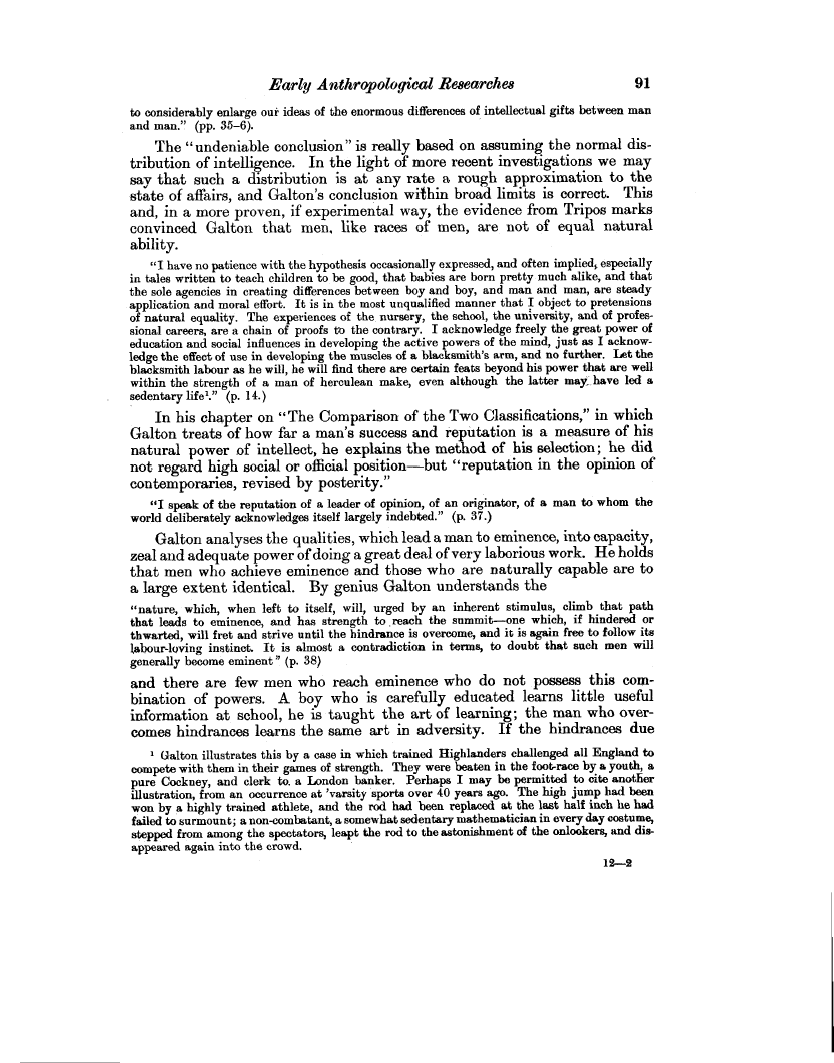Early Anthropological Researches 91
to considerably enlarge our ideas of the enormous differences of intellectual gifts between man and man." (pp. 35-6).
The "undeniable conclusion" is really based on assuming the normal distribution of intelligence. In the light of more recent investigations we may say that such a distribution is at any rate a rough approximation to the state of affairs, and Galton's conclusion within broad limits is correct. This and, in a more proven, if experimental way, the evidence from Tripos marks convinced Galton that men, like races of men, are not of equal natural ability.
"I have no patience with the hypothesis occasionally expressed, and often implied, especially in tales written to teach children to be good, that babies are born pretty much alike, and that the sole agencies in creating differences between boy and boy, and man and man, are steady application and moral effort. It is in the most unqualified manner that I object to pretensions of natural equality. The experiences of the nursery, the school, the university, and of professional careers, are a chain of proofs to the contrary. I acknowledge freely the great power of education and social influences in developing the active powers of the mind, just as I acknowledge the effect of use in developing the muscles of a blacksmith's arm, and no further. Let the blacksmith labour as he will, he will find there are certain feats beyond his power that are well within the strength of a man of herculean make, even although the latter may-, have led a sedentary life'." (p. 14.)
In his chapter on "The Comparison of the Two Classifications," in which Galton treats of how far a man's success and reputation is a measure of his natural power of intellect, he explains the method of his selection; he did not regard high social or official position-but "reputation in the opinion of contemporaries, revised by posterity."
"I speak of the reputation of a leader of opinion, of an originator, of a man to whom the world deliberately acknowledges itself largely indebted." (p. 37.)
Galton analyses the qualities, which lead a man to eminence, into capacity, zeal and adequate power of doing a great deal of very laborious work. He holds that men who achieve eminence and those who are naturally capable are to a large extent identical. By genius Galton understands the
"nature, which, when left to itself, will, urged by an inherent stimulus, climb that path that leads to eminence, and has strength to. reach the summit-one which, if hindered or thwarted, will fret and strive until the hindrance is overcome, and it is again free to follow its labour-loving instinct. It is almost a contradiction in terms, to doubt that such men will generally become eminent" (p. 38)
and there are few men who reach eminence who do not possess this combination of powers. A boy who is carefully educated learns little useful information at school, he is taught the art of learning; the man who overcomes hindrances learns the same art in adversity. If the hindrances due
' Galton illustrates this by a case in which trained Highlanders challenged all England to compete with them in their games of strength. They were beaten in the foot-race by a youth, a pure Cockney, and clerk to, a London banker. Perhaps I may be permitted to cite another illustration, from an occurrence at 'varsity sports over 40 years ago. The high jump had been won by a highly trained athlete, and the rod had been replaced at the last half inch he had failed to surmount; a non-combatant, a somewhat sedentary mathematician in every day costume, stepped from among the spectators, leapt the rod to the astonishment of the onlookers, and disappeared again into the crowd.
12-2

